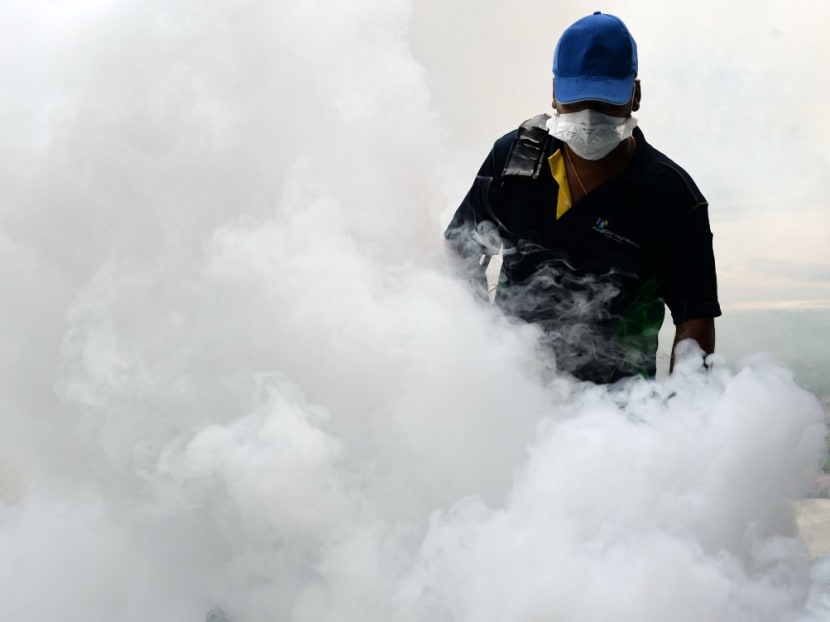Dengue risk remains as Aedes mosquito population has grown: NEA
SINGAPORE — Although the number of dengue cases has remained "relatively stable" for the past few weeks, the Aedes mosquito population is still high in some areas of Singapore, said the National Environment Agency (NEA) on Monday (Jan 25).

A pest control worker fumigates the grounds of a residential estate in the Bedok North area of Singapore.
SINGAPORE — Although the number of dengue cases has remained "relatively stable" for the past few weeks, the Aedes mosquito population is still high in some areas of Singapore, said the National Environment Agency (NEA) on Monday (Jan 25).
The Aedes mosquito population rose by about eight per cent in December, said NEA.
In addition, two less common dengue serotypes — DENV-3 and DENV-4 — now make up more than half of the infections.
"If left unchecked, the current high Aedes aegypti mosquito population, coupled with the not insignificant number of dengue cases currently and the sizeable proportion of residents still working from home, would add to the dengue risk this year," said NEA.
A total of 156 dengue cases were reported last week, which is less than half of the 343 cases recorded in the same period last year.
DENGUE IN 2020
Last year’s dengue outbreak was “historic”, with a total of 35,315 cases reported, said NEA in its review of the situation in 2020.
The agency noted that the number of weekly cases rose sharply in May, shortly after the start of the Covid-19 circuit breaker period and eventually peaked in July.
In response, NEA conducted an "intensive two-week islandwide exercise" in July to fight dengue, noting that the Singapore Contractors Association intensified audits of its member sites after circuit breaker measures were eased.
Last year, NEA conducted about 1 million inspections islandwide to eradicate mosquito breeding habitats. These included about 7,400 checks at construction sites, said the agency, adding that about 23,400 mosquito breeding habitats were uncovered.
About 430 summonses and 37 stop work orders were issued to construction sites, and 27 contractors were charged in court for repeat offences, NEA said.
As for homes, since the implementation of heavier penalties on July 15, NEA said it detected multiple mosquito breeding in 346 of the residential premises inspected, and repeated mosquito breeding in about 330 of homes inspected.
POSSIBLE RISE IN DENGUE STRAINS THIS YEAR
While DENV-2 remains the predominant dengue virus serotype in Singapore, there has been an increase in the proportion of cases and clusters involving the DENV-3 and DENV-4 strains over the past month, said NEA.
"As Singapore has not seen a DENV-3 outbreak in the three decades before 2020, and has not seen a large recorded outbreak of DENV-4, the population immunity for DENV-3 and DENV-4 is low, and more people are susceptible to transmission of the virus," said NEA.
"It is thus critical that all residents and stakeholders work closely together with NEA to break dengue transmission in these clusters, and curtail the spread of the virus."
As of Jan 22, among the five largest dengue clusters, DENV-3 was detected in the cluster at Jalan Gembira/Jalan Mesra, and DENV-4 was detected in the clusters at Bedok North Street 3 and Gangsa Road.
Ahead of Chinese New Year, when homes and other places may be decorated with more ornamental plants, NEA said all stakeholders should keep an eye out for mosquito breeding sites.
“Homeowners doing spring cleaning are reminded to properly dispose of any refuse, including large furniture or household items, to avoid the discarded materials from becoming unintentional mosquito breeding habitats,” NEA said.
The agency added that is has completed inspections of all plant nurseries, and has distributed advisories and pamphlets to all nursery operators on preventing mosquito breeding. CNA
For more stories like this, visit cna.asia.






